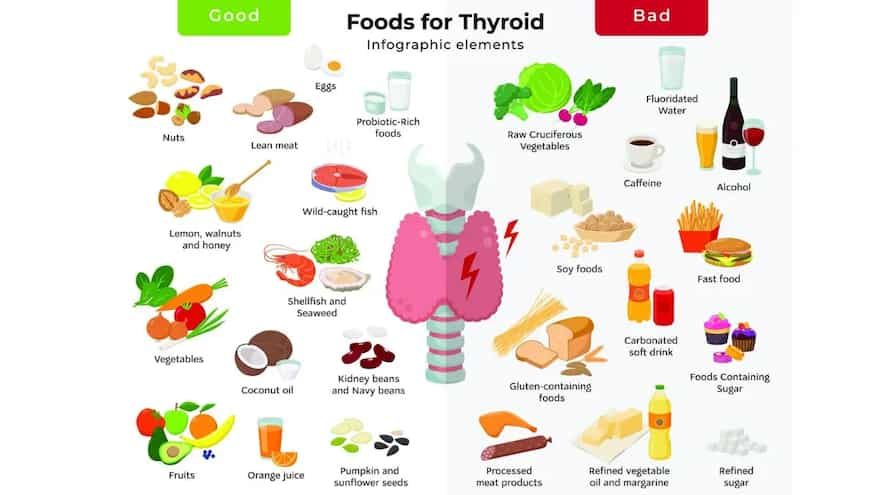Are you feeling sluggish, tired, and having trouble maintaining a healthy weight? It might be time to check your thyroid. Hypothyroidism is a common condition that affects the thyroid gland, slowing down your body's metabolism and causing a range of bothersome symptoms. The good news is that you can take charge of your health with the power of food! In this article, we'll explore what to eat and what to avoid to support your thyroid and bring back that energetic spark.
Understanding Hypothyroidism
Before we dive into the delicious details, let's get a quick grasp on hypothyroidism. Your thyroid gland is like a little butterfly-shaped powerhouse located in your neck that controls your metabolism. When it's underactive, it leads to hypothyroidism, and that's when things get a bit sluggish. You might experience weight gain, fatigue, dry skin, and hair loss – a real party pooper!
Thyroid-Friendly Superstars
Now, let's talk about some of the superstar foods that can help keep your thyroid happy:
1. Iodine-Rich Foods:
Your thyroid loves iodine like you love your mom's cooking. Including iodine-rich foods like seaweed, iodized salt, fish, and dairy products can help support your thyroid function. But don't go overboard; a pinch of iodized salt here and there will do the trick.
Selenium is like a superhero that helps your body produce the right amount of thyroid hormones. Grab a handful of Brazil nuts, chia seeds, or sunflower seeds to keep your selenium levels up and your thyroid in tip-top shape.
3. Magnificent Magnesium:
Let's get the party started with magnesium! Leafy greens, nuts, and whole grains are fantastic sources of magnesium. They help in converting the inactive thyroid hormone (T4) to its active form (T3) – a key process for optimal thyroid function.
4. Protein Power:
Who doesn't love a protein-packed meal? Hypothyroidism can lead to muscle loss, so it's essential to include protein sources like lean meats, legumes, and tofu to maintain those lovely muscles and support thyroid health.
Soak up some sun or munch on foods like fatty fish, fortified cereals, and egg yolks to boost your vitamin D levels. A sunny vitamin D status is linked to better thyroid function.

Steer Clear of Thyroid Troublemakers
Now that we've covered the tasty treats for your thyroid let's talk about the things to avoid or consume in moderation:
1. Go Easy on Goitrogens:
Goitrogens might sound like an alien species, but they're just compounds found in certain foods that can interfere with thyroid hormone production. Foods like cabbage, broccoli, cauliflower, and soy products can be goitrogenic. Don't cut them out entirely, though – cooking or fermenting these veggies reduces their goitrogenic effects.
2. Limit Your Sugar Intake:
We know it's hard, but try to cut back on those sugary treats. High sugar consumption can mess with your hormone balance and worsen hypothyroid symptoms. Opt for natural sweeteners like honey or maple syrup when the cravings kick in.
3. Beware of Processed Foods:
Step away from the packet! Processed foods often contain unhealthy fats, refined sugars, and excess salt, which can wreak havoc on your thyroid function. Stick to wholesome, real foods for a happier thyroid.
4. Gluten: Friend or Foe?
For some with hypothyroidism, gluten can be a real troublemaker. It may trigger autoimmune responses and inflammation in some individuals. If you suspect gluten is causing issues, consult a healthcare professional to explore a gluten-free lifestyle.
Healthy Habits and Hydration
Apart from the delicious foods mentioned above, some healthy habits and proper hydration can work wonders for your thyroid and overall health:
1. Move Your Body:
Physical activity is essential for maintaining a healthy metabolism. Whether it's a dance session in your living room or a leisurely walk in the park, find activities you enjoy and get moving.
2. Manage Stress:
Stress can be a thyroid's worst enemy. Practice mindfulness, meditation, or indulge in activities that help you unwind and manage stress levels effectively.
3. Stay Hydrated:
Sip on that water, folks! Staying hydrated supports various bodily functions, including your thyroid's well-being.
4. Adequate Sleep:
Sleep is your body's time to rest, repair, and rejuvenate. Aim for 7-9 hours of quality sleep every night. A well-rested body is better equipped to regulate hormones, including those produced by the thyroid.
5. Regular Thyroid Check-ups:
Keep an eye on your thyroid health by getting regular check-ups with your healthcare provider. Monitoring your thyroid hormone levels can help you and your doctor make any necessary adjustments to your diet and medication.
Nourishing your thyroid doesn't have to be boring or tasteless. Embrace these thyroid-friendly foods, cut back on the troublemakers, and adopt some healthy habits to support your thyroid health. Remember, small changes can lead to big improvements, so let's take control of our health one delicious bite at a time.


